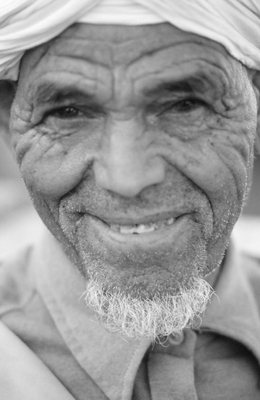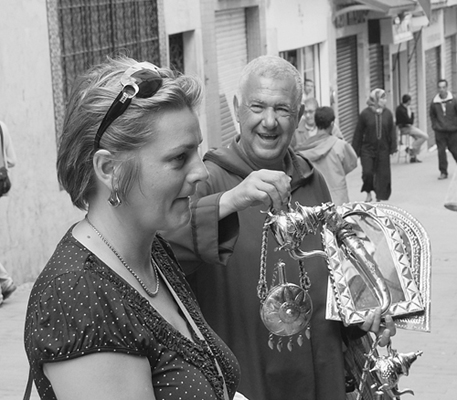
Al-Maghreb
A young country with an old history, Morocco is a photographer’s delight and a budget traveler’s dream. It’s cheap, exotic, and easier and more appealing than ever. Along with a rich culture, Morocco offers plenty of contrast—from beach resorts to bustling desert markets, from jagged mountains to sleepy, mud-brick oasis towns. And there’s a distinct new energy as its popular activist king asserts his vision.
Morocco (Marruecos in Spanish; Al-Maghreb in Arabic) also provides a good dose of culture shock—both bad and good. It makes Spain seem meek and mild. You’ll encounter oppressive friendliness, brutal heat, the Arabic language, the Islamic faith, ancient cities, and aggressive beggars.
While Morocco is clearly a place apart from Mediterranean Europe, it doesn’t really seem like Africa either. It’s a mix, reflecting its strategic position between the two continents. Situated on the Strait of Gibraltar, Morocco has been flooded by waves of invasions over the centuries. The Berbers, the native population, have had to contend with the Phoenicians, Carthaginians, Romans, Vandals, and more.
The Arabs brought Islam to Morocco in the seventh century A.D. and stuck around, battling the Berbers in various civil wars. A series of Berber and Arab dynasties rose and fell; the Berbers won out and still run the country today.
From the 15th century on, European countries carved up much of Africa. By the early 20th century, most of Morocco was under French control, and strategic Tangier was jointly ruled by multiple European powers. The country wasn’t granted independence until 1956. In the late 1970s, Morocco itself became an invading country, grabbing Spain’s Western Sahara territory and causing the relatively few inhabitants to clamor for independence. Western Sahara’s claim still has not been settled by the United Nations.

Unfortunately, most of the English-speaking Moroccans the typical tourist meets are hustlers. Many visitors develop some intestinal problems by the end of their visit. Most women are harassed on the streets by horny but generally harmless men. And in terms of efficiency, Morocco makes Spain look like Sweden.
When you cruise south across the Strait of Gibraltar, leave your busy itineraries and split-second timing behind. Morocco must be taken on its own terms. In Morocco things go smoothly only “Inshallah”—if God so wills.
Politics: Americans pondering a visit understandably wonder how they’ll be received in this Muslim nation. Al Jazeera blares from televisions in all the bars, but I’ve seen no angry graffiti or posters and felt no animosity toward American individuals there (even on my last visit, literally days after US forces killed Osama bin Laden). Western visitors feel a warm welcome in post-9/11 Morocco. And it’s culturally enriching for Westerners to experience Morocco—a Muslim monarchy with women still in traditional dress and roles, succeeding on its own terms without embracing modern Western “norms.”
Hustler Alert: Moroccans may be some of Africa’s wealthiest people, but you are still incredibly rich to them. This imbalance causes predictable problems. Wear your money belt. Assume con artists are more clever than you. Haggle when appropriate; prices skyrocket for tourists. You’ll attract hustlers like flies at every famous tourist sight or whenever you pull out your guidebook or a map. In the worst-case scenario, they’ll lie to you, get you lost, blackmail you, and pester the heck out of you. Never leave your car or baggage where you can’t get back to it without someone else’s “help.” Anything you buy in a guide’s company gets him a 20 percent commission. Normally locals, shopkeepers, and police will come to your rescue if the hustlers’ heat becomes unbearable. Consider hiring a guide, since it’s helpful to have a translator, and once you’re “taken,” the rest seem to leave you alone.

Marijuana Alert: In Morocco, marijuana (kif) is as illegal as it is popular, a fact that many Westerners in local jails would love to remind you of. As a general rule, just walk right by those hand-carved pipes in the marketplace. Some dealers who sell it cheap make their profit after you get arrested. Cars and buses are stopped and checked by police routinely throughout Morocco—especially in the north and in the Chefchaouen region, which is Morocco’s kif capital.
Health: Morocco is much more hazardous to your health than Spain. Eat in clean—not cheap—places. Peel fruit, eat only cooked vegetables, and drink reliably bottled water (Sidi Ali or Sidi Harazem). When you do get diarrhea—and you should plan on it—adjust your diet (small and bland meals, no milk or grease) or fast for a day, but make sure you replenish lost fluids. Relax: Most diarrhea is not serious, just an adjustment that will run its course.
Closed Days and Ramadan: Friday is the Muslim day of rest, when most of the country (except Tangier) closes down. During the major month-long religious holiday of Ramadan (July 9-Aug 7 in 2013), Muslims focus on prayer and reflection. Following Islamic doctrine, they refrain during daylight hours from eating, drinking (including water), smoking, and having sex. On the final day of Ramadan, Muslims celebrate Eid (an all-day feast and gift-giving party, similar to Christmas), and travelers may find some less-touristy stores and restaurants closed.
Money: Euros work here (as do dollars and pounds). If you’re on a five-hour tour, bring along lots of €1 and €0.50 coins for tips, small purchases, and camel rides. But if you plan to do anything independently, change some money into Moroccan dirhams upon arrival (8 dh = about $1).
Information: Travel information, English or otherwise, is rare here. For an extended trip, bring guidebooks from home or Spain—Lonely Planet and Rough Guide both publish good ones. Buy the best map you can find locally—names are always changing, and if you need to ask someone, it’s helpful to have towns, roads, and place names written in Arabic.
Language: With its unique history of having been controlled by so many different foreign and domestic rulers, Tangier is a babel of languages. Most locals speak Arabic first and French second (all Moroccans must learn it in schools); sensing that you’re a foreigner, they’ll most likely address you in French. Spanish ranks third, and English a distant fourth. The Arabic squiggle-script, its many difficult sounds, and the fact that French is Morocco’s second language combine to make communication tricky for English-speaking travelers. A little French goes a long way, but learn a few words in Arabic. Have your first local friend help you with the pronunciation:
| English | Arabic | Pronounced |
| Hello. (“Peace be with you”) | Salaam alaikum. | sah-LAHM ah-LAY-koom |
| Hello. (response: “Peace also be with you”) | Wa alaikum salaam. | wah ah-LAY-koom sah-LAHM |
| Please. | Min fadlik. | meen FAHD-leek |
| Thank you. | Shokran. | SHOH-kron (like “sugar on”) |
| Excuse me. | Ismahli. | ees-SMAH-lee |
| Yes. | Yeh. | EE-yeh |
| No. | Lah. | lah |
| Give me five. (kids enjoy this...not above but straight ahead) | Ham sah. | hahm sah |
| OK. | Wah hah. | wah hah |
| Very good. | Miz yen biz ef. | meez EE-yehn beez ehf |
| Goodbye. | Maa salama. | mah sah-LEM-ah |
Moroccans are more touchy-feely than their Spanish neighbors. Expect lots of hugs if you make an effort to communicate. When greeting someone, a handshake is customary, followed by placing your right hand over your heart. Listen carefully and write new words phonetically. Bring an Arabic phrase book. It helps to know that souk means a particular market (such as for leather, yarn, or metalwork), while a kasbah is loosely defined as a fortress (or a town within old fortress walls). In markets, I sing, “la la la la la” to my opponents. Lah shokran means “No, thank you.”